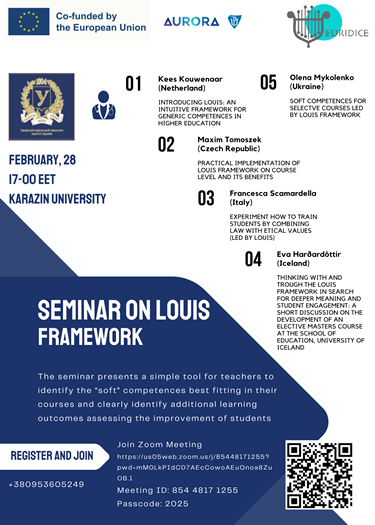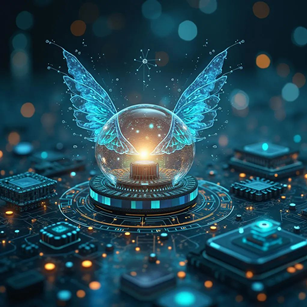
Trainings and workshops for academic staff and students
LOUIS FRAMEWORK seminar for academic community

A seminar for the academic community on the “LOUIS FRAMEWORK” was held within the international EURIDICE project on February, 28.
The event was opened by Kees Kouwenaar, former Aurora Secretary General (retired). The speaker was also Francesca Scamardella, Associate Professor at the Department of Law at the University of Naples Federico II, where she teaches Ethics and Professional Deontology, Governance and Business Ethics. The discussion was continued by Olena Mykolenko, EURIDICE Project Manager at Karazin University. And finally, the event was concluded by Maxim Tomoszek, Vice-Dean for Bachelor and Master Degree Programs at Palacký University, President of the European Network for Clinical Legal Education.
The seminar aimed to show to how to increase the impact of teaching, and more actively engage students in learning. The presented LOUIS Framework will help to demonstrate general and soft skills to students and can be integrated into the structure of courses in Ukrainian educational institutions. In total, more than 70 participants from educational institutions of Ukraine took part in the event.
LOUIS (AURORA Competence Framework) is a tool that supports academic teachers to articulate learning outcomes for general academic and personal competences. It deconstructs broad competences like ‘critical thinking’ into more tangible elements and describes students’ competence in these from lower to higher levels of proficiency and complexity.
The program can be found at the link.
More about the EURIDICE project.
THE ADVANCED TRAINING COURSE 'DIGITAL TECHNOLOGIES FOR INCLUSIVE EDUCATION'

Welcome to the advanced training course 'Digital Technologies for Inclusive Education' (3 ECTS), which equips academic staff and other professionals with modern digital technologies to ensure equal access to quality education, including people with special educational needs.
Course topic
Digital technologies for inclusive education make education accessible to all, including people with special educational needs. They help create an inclusive environment where everyone has equal opportunities to learn, adapt materials and interact. Digital technologies open up new opportunities for implementing an individual approach, adapting educational content, and organizing a convenient and flexible educational process.
Course structure (topics)
- Fundamentals of inclusive education. Digital technologies in inclusive education.
- Adaptive technologies and software.
- Interactive training tools.
- Digital technologies for augmentative and alternative communication (AAC).
- Web resources and online tools for inclusive education.
- Safety and ethics of using digital technologies for children with SEN.
Setting up the course
Participants will complete practical assignments that focus on the application of tools adapting learning content, including:
- Setting up digital tools and installing special applications for working in an inclusive environment.
- Work in the Digital Inclusion mobile application.
- Creating PowerPoint presentations with special features for users with special needs.
- Using digital communicators and AAC in the educational process.
- Creation and implementation of gamified content.
- Creating special educational content for SEN.
Read more about setting up the course, аssessment, participation requirements, form of education, lecturer team.
















University in Social Media: